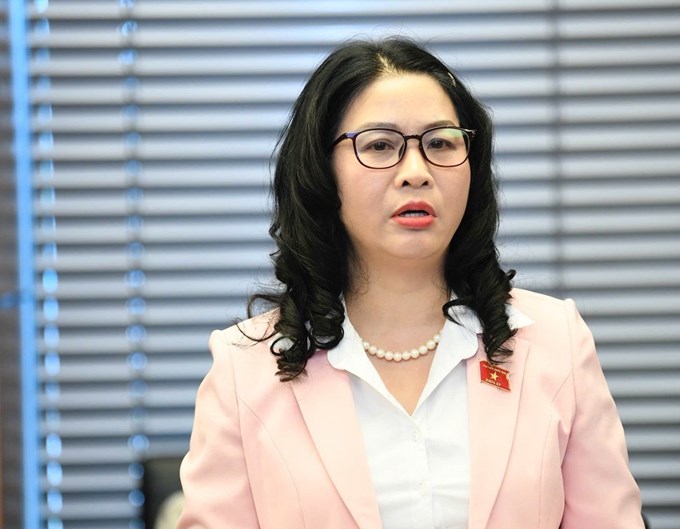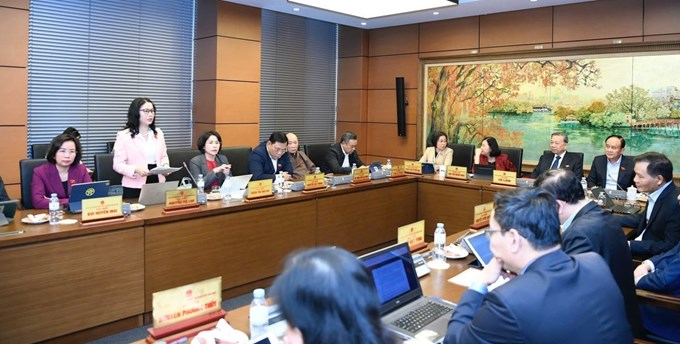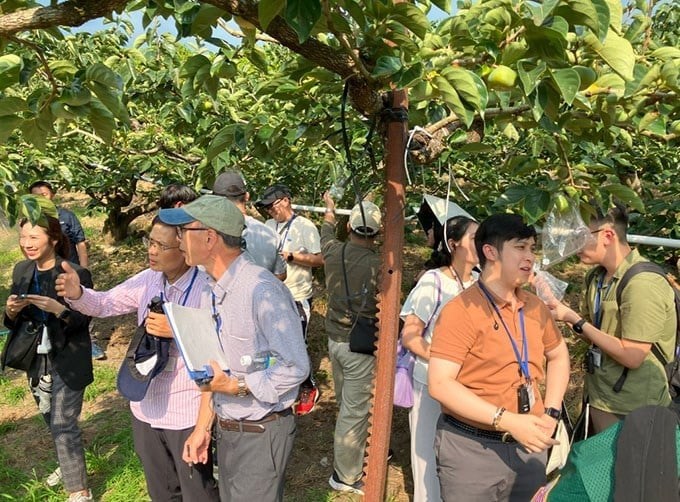That was the opinion of National Assembly Deputy Nguyen Thi Lan, President of Vietnam National University of Agriculture (VNUA), at the conference contributing feedback on the draft Political Report to be presented at the 14th National Party Congress.
National Assembly Deputy Nguyen Thi Lan, VNUA’s President (Hanoi Delegation), highly appreciated the preparation of the draft Political Report to be presented at the 14th National Party Congress, while proposing several issues that should be clarified and specified to enhance the feasibility of the document.
Prof. Dr. and Meritorious Teacher Nguyen Thi Lan emphasized that the current draft had been prepared meticulously and scientifically, demonstrating a strong sense of responsibility, a spirit of innovation, and a forward-looking vision. It comprehensively reflected the country’s situation after five years of implementing the Resolution of the 13th Party Congress and 40 years of national renovation. The report not only inherited valuable lessons from previous congresses but also incorporated many new and relevant contents to meet the development requirements of the new era.

National Assembly Deputy Nguyen Thi Lan, VNUA’s President (Hanoi Delegation), highly appreciates the preparation of the draft Political Report to be presented at the 14th National Party Congress. Photo by VNUA.
A key highlight of the Report was its spirit of innovation and its strong aspiration for rapid and sustainable development, grounded in science, technology, innovation, and digital transformation, and closely linked to green, circular, and knowledge-based economic models. The Report affirmed that people were at the center, the goal and the driving force of development, while emphasizing social justice and welfare, as well as the need to build and strengthen a clean, strong Party and political system, to ensure effective power control, and to fight corruption efficiently.
Along with that, the Report outlined orientations for regional development, emphasizing stronger regional linkages, the expansion of an independent and self-reliant foreign policy, proactive international integration, and the goal of enhancing Vietnam’s prestige and position in the international arena.
Clarify the strategic breakthroughs more clearly
According to Deputy Nguyen Thi Lan, the section on “Key Tasks and Strategic Breakthroughs” in the draft report was comprehensively and inclusively developed, clearly reflecting the orientation toward rapid and sustainable development. The six key tasks and three strategic breakthroughs emphasized the pivotal role of science, technology, innovation, and digital transformation, with people as the center of development.
However, to make the document more profound and practical, Deputy Nguyen Thi Lan suggested clarifying the substance of the institutional breakthrough, especially in the context of digital transformation and international integration, so that the institution would truly serve as a transparent, flexible, and adaptive legal framework that can quickly adapt to practical realities.
At the same time, she proposed adding a strategic direction for developing a national innovation ecosystem, strengthening the linkages between the State, enterprises, research institutes, and universities in order to maximize internal resources and creative capacity.
Deputy Nguyen Thi Lan also emphasized the importance of culture and human development as a strategic breakthrough, considering them the spiritual foundation and intrinsic driving force for sustainable development.
In addition, she suggested incorporating orientations for the development of key economic regions, the maritime economy, and ensuring non-traditional security, including energy, water resources, environment, and cybersecurity, the emerging global issues.

National Assembly Deputy Nguyen Thi Lan proposes that several contents in the draft political report should be further clarified and specified to enhance its feasibility. Photo by VNUA.
Ms. Lan stated that if these contents were further specified, the Report would become more comprehensive and feasible, thereby contributing to the realization of the goal of rapid and sustainable national development in the new period.
Foreign affairs – from “active participation” to “proactive leadership”
Regarding foreign affairs and international integration, Deputy Nguyen Thi Lan noted that the draft Report reflected the spirit of the Politburo’s Resolution No. 59, which emphasized an independent, self-reliant, peaceful, cooperative, and development-oriented foreign policy, while promoting proactive and comprehensive international integration. The Report marked a shift from “active participation” to “proactive leadership and initiative,” aligning with Vietnam’s increasingly elevated position on the global stage.
To make this section more comprehensive, the National Assembly deputy proposed clarifying the role of economic diplomacy in economic recovery and growth model transformation, particularly in leveraging new-generation FTAs and attracting resources for green and digital transitions.
She also recommended adding content on science–technology diplomacy and green energy diplomacy, enabling Vietnam to access advanced technologies and foster a knowledge-based economy; as well as emphasizing cultural diplomacy to promote Vietnam’s image as a friendly, innovative nation and to contribute to building a strong national brand.
She also emphasized the need to further clarify the roles of people-to-people diplomacy and digital diplomacy, important channels for strengthening external communications, enhancing connectivity, and expanding the reach of information in the digital era.
According to National Assembly Deputy Nguyen Thi Lan, if these aspects were more clearly articulated, the Report and the Action Program would fully embody the spirit of innovation and creativity in foreign affairs, reflecting a proactive, modern vision that aligned with Vietnam’s current position and development aspirations.
Science, technology, and digital transformation as strategic driving forces
Addressing the development of science, technology, innovation, and national digital transformation, National Assembly Deputy Nguyen Thi Lan noted that the Report fully embodied the spirit of Resolution No. 57, considering these areas as key driving forces for a rapid and sustainable development.
She emphasized that several aspects should be further specified to make this section more groundbreaking and feasible. First, it was important to formulate strong policies that encourage innovation and technological entrepreneurship; and to focus on developing biotechnology, precision agriculture, and smart agriculture, the fields with high potential for creating added value.

VNUA’s staff and lecturers take part in a field study at the farm of Kinosato Cooperative, Japan.
Photo by VNUA.
Following that, she suggested clarifying the content related to data protection, technology security, and digital sovereignty, considering these as vital factors for sustainable development in the digital era.
At the same time, she emphasized the need to strengthen international cooperation in high technology, green energy, and artificial intelligence; and to enhance the linkage between the State, enterprises, research institutes, and universities to build sustainable innovation capacity.
“If these contents are further emphasized and specified, they will help institutionalize the spirit of Resolution No. 57, turning science, technology, innovation, and digital transformation into truly strategic driving forces for the nation’s development in the coming period,” Ms. Nguyen Thi Lan stressed.